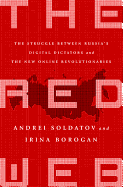
The collapse of the Soviet Union unleashed freedom and chaos in equal measure on the Russian people. A society where information was once strictly controlled suddenly opened to the antithesis of censorship and repression--the Internet. As Western capital flooded into the new Russian Federation during the 1990s, digital networks sprouted from fledgling Internet service providers and connected Russians with each other and the world online. It was a time of turbulence, but also of optimism among the Russian intelligentsia.
Then came Vladimir Putin. The former KGB agent rose from St. Petersburg bureaucrat to Russian president by 2000. His consolidation of power meant strangling critical free media: first television stations, then print publications and, most recently, the Internet. The Red Web describes how Putin's authoritarianism has fueled blacklists banning "objectionable" websites and the ubiquitous use of SORM, a small device that allows the FSB (successors of the KGB) to monitor everything that passes through Russian servers, including e-mails and social network posts. Even foreign companies like Google and Twitter are increasingly cooperating with Putin.
Russian journalists Andrei Soldatov and Irina Borogan (The New Nobility), co-founders of security services watchdog Agentura.ru, are among those dissidents pushing back against Putin's Internet power grab. In The Red Web, they expose the history of mass surveillance in the Soviet Union, its reemergence in the Russian Federation, and how Putin's crackdown on free media fits into his overall totalitarian scheme. But, according to the authors, Putin is handicapped by his own KGB worldview, where dissident organizations can be decapitated and defeated. The decentralized power structure of the Internet may yet be Putin's undoing. --Tobias Mutter, freelance reviewer

